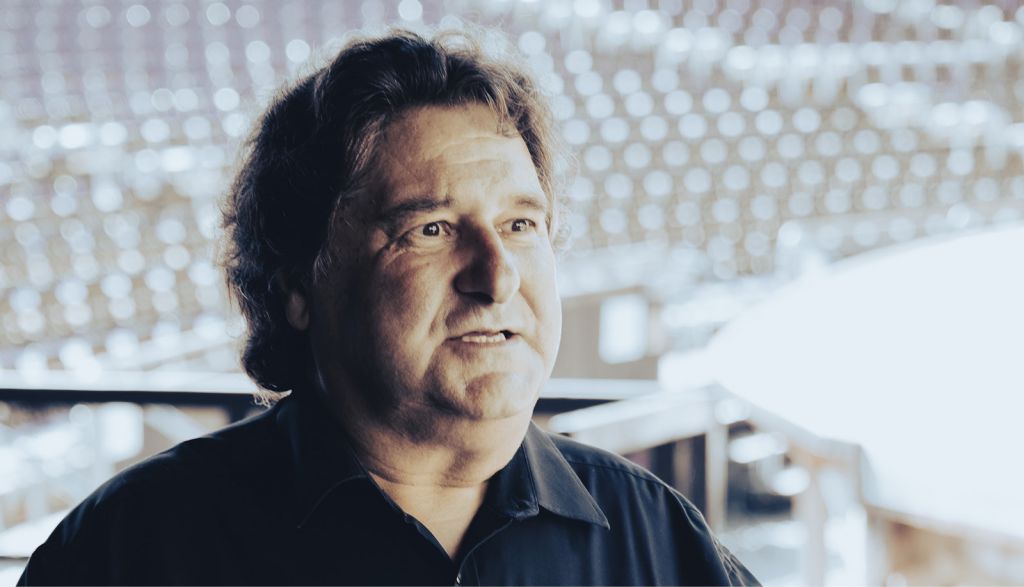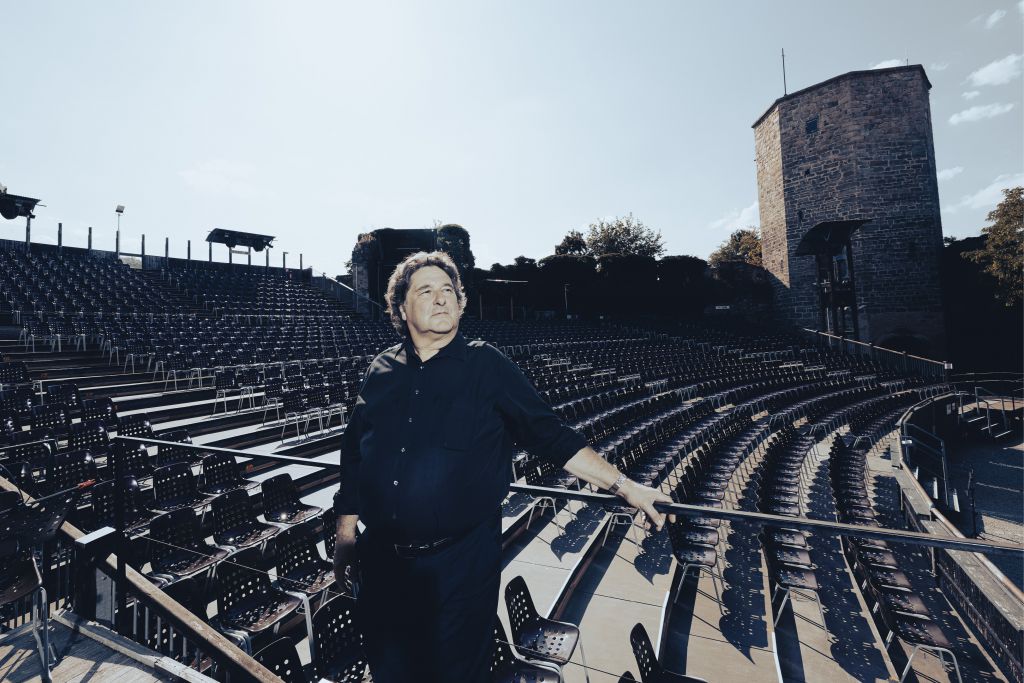How the conductor, mdw professor, and musicologist Johannes Wildner is making active and reflective use of the pandemic, and why he views this crisis as an opportunity.
“Grüß Gott! Johannes Wildner here, the Wanderer vom Eichkogel, bidding you a warm welcome to our Eichkogel wanderings together.” It’s with these words that the conductor greets his YouTube viewers each episode—which is to say: every day. For what began on 22 March 2020 as an announcement of concert cancellations due to the pandemic and continued in the form of updates “from cultural quarantine” soon turned into daily observations regarding the most varied contemporary and historical themes. Wildner also makes use of numerous commemorative dates in order to convey timeless topics and personally held values.

Wildner, who is also artistic director of the summer opera festival Oper Burg Gars, has indeed suffered from no shortage of material. And it was at the ruins of this festival’s namesake, Castle Gars, that mdw Magazine met him recently for an interview. The opera festival, with Mozart’s Die Entführung aus dem Serail staged in these castle ruins wonderfully situated in Austria’s Waldviertel region, was in full swing with little time to spare—but even so, its artistic director expounded with unbroken energy upon both the castle’s history and the opera festival with an exceptional degree of historical incisiveness.
Johannes Wildner’s video project first began when the pandemic forced a concert of the Vienna Johann Strauss Orchestra, which had been scheduled for 1 May 2020, to be cancelled. As the orchestra’s conductor, it fell to him to put out some video messages in order to explain the situation to their international audience. However, Wildner refused to use a professional camera team—and instead simply held up his smartphone and pressed “record”. Precisely this “homespun” quality, as Wildner puts it, was extremely well received by his audience—and he’s remained true to this style ever since.
Wildner recounts how things continued: “My idea to do it on the Eichkogel came from the fact that I can walk right up there from our backyard in Mödling, with zero need to use any public thoroughfares.” So he began taking his audience along with him on these rambles, starting out by telling them stories about Johann Strauss and Ludwig van Beethoven. Several media outlets in Austria and Germany soon became aware of his series of short videos, asking him questions and giving him new ideas. “It was beginning with the 50th Coronawanderung [Corona Ramble], as I still called them at the time, that I went beyond speaking just about the Strauss Orchestra and took up other topics,” recalls the conductor. And when his 70th episode rolled around, he began calling these videos Eichkogel-Wanderung [Eichkogel Ramble] to get rid of the negative COVID-connotation and do justice to what—at that time, at least—was viewed as the approaching end of the pandemic. His rambles themselves likewise soon began wandering geographically farther afield, as well, along the Baden Wine Route and up to the Husarentempel [Hussars’ Temple] and the Anninger, Mödling’s backyard mountain, following in the footsteps of Beethoven and Schubert.
“I really do think I’ll be continuing with it, since I keep getting new ideas all the time,” says the artistic director with a smile when asked about the future of his video series. “The main thing for me is the joy I get from telling people something I’m thinking about at the moment, passing on something that’s important to me. A role model for me, here, is [the ORF weatherwoman and scientist] Christa Kummer. And in the interest of economising, minimising, and leaving a smaller footprint in order to go easier on the environment and reduce CO2 emissions, I, too, am attempting to start a movement—a hiking movement fit to lead us back into unadulterated romanticism, where we perceived things more dynamically and were able to see behind the façades.” Encounters, experiences, and anniversaries from the realms of culture, history, and politics are other things that fuel the reflections documented by Wildner in video and audio. “Just where has the people of Schiller and Goethe ended up, and just what have we been doing with the values of the French Revolution over the past 200 years?” It’s questions like these, says Wildner, that accompany him on his daily jaunts. “And for myself, these walks also open my eyes to how everyday things can be so unbelievably fascinating, informative, and revealing.”
Asked as to the importance of resilience, our Wanderer vom Eichkogel makes renewed reference to the romantic era. “That period of history can teach us that we need not fear the future, nor need we fear change—for these things will come regardless.” And on the past one-and-a-half years, in particular, his take is likewise positive: “These times have taught us a whole lot about teaching online—which is an outstanding way of reaching international students who can’t come to Vienna. I taught one student, who ended up being unable to leave China for an entire year, via Zoom. And we also use these media in creative ways. For instance, we’ll have a student play a piece on the piano. That then gets sent on to a second student, who proceeds to conduct it. And a third student provides feedback. We keep coming up with new ideas. But there are limitations, of course, especially when it comes to orchestral work and performance opportunities.”

Johannes Wildner concludes with the following words: “If the COVID-19 experience has taught us anything, it’s to avoid constant dependence on daily applause and, instead, arrive at a definition of self-esteem that’s within us rather than externally derived. Our feeling of self-esteem also shouldn’t be affected by the level of financial remuneration for a performance—for the true value of what we have to offer is likewise something that we define within ourselves. I’m grateful to have had this experience. Of course, for someone who’s at the beginning of their career, it’s an experience that’s very difficult to accept: student conductors and instrumentalists want to go out and audition, after all. But as a teacher, I view it as my responsibility to help and to show students what they can prepare so that they’ll be ready to present it when the time does come. I’m fond of comparing this kind of development with a plant that shoots up from a crack in the pavement and blossoms. Imagination requires space. Everyone needs to be active. And lots of things are possible. The only non-starter is to complain.”

